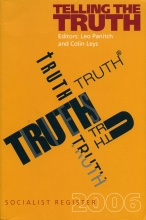
| Home News Releases | Calendar Contact |
Sources Bookshelf

Socialist Register 2006:
Volume 42: Telling the Truth
Panitch, Leo; Keys, Colin (eds.)
Publisher: MerlinYear Published: 2005
Pages: 285pp Price: $29.95 ISBN: 1-55266-176-8
Library of Congress Number: P95.8.S62 2004 Dewey: 0001.1
Please see our media profile in Sources:
Connexions Library
Telling the Truth is a collection of essays that examines the difficulties of illuminating the degenerative and secretive nature of public life. According to Panitch and Leys, the greatest threats to governmental legitimacy are the pressures of market forces caused by global neoliberalism and its consequences: social dislocation and ecological degradation. These "legitimacy problems" manifest within public life in the forms of secrecy, ambiguous communication and dishonesty. For example, today governments use the scapegoat of the "war on terror" to hide their actions from the public and withhold information, routinely label basic information as "sensitive" and enact drastic laws (such as the US Patriot Act) to validate state surveillance of citizens.
However, the editors argue that the US and British governments' actions in respect to Iraq are only one example of a larger problem. Thus, the rarity of "plain speaking politicians," the compromise of journalistic professionalism, the corporate sales-pitch mentality pervading all factors of life and the increasingly commercial nature of scientific research are all evidence of the general disregard for truth in public life. Despite this gloomy reality, the editors provide indicate that this degenerated discourse can be both challenged and reversed. Consequently, they advise the reader to think and speak critically amidst the "proto-fascist culture" of public life in order to make this lack of transparency and its causes visible.
Each of the 13 essays illuminate a distinct perspective or specific aspect of this issue: In the first essay, Leys analyses the cynical state in West in the context of the UK under 'New Labour' government. Boron critiques the notion of "capitalist democracies" in Latin America arguing that democracy remains secondary to the goals of capitalism. Henwood discusses how capitalist interests are often disguised under the label of the "business community," while the next two chapters examine class wars for the agenda of welfare reform and law and order. The sixth and seventh essays examine the failure of the US and UK media to challenge official lies about Iraq, while Fine and Waeyenberge show how renowned liberal economist Stiglitz remains limited by his disciplinary training, making him unable to analyze the structural factors determining the redistribution of power and market information. Similarly, Reddy shows the limitations of G8 rhetoric about global poverty which conceals both the extent and the needs of the poor. In his uniquely optimistic essay, Kustow examines the political role of theatre in telling the truth. The next two essays by Sanbonmatsu and Tamas look at the dominance of postmodernism and leftist censorship in academia and the ambiguity of class in the socialist project respectively. Finally, Eagleton encapsulates the overall discourse of the collection by emphasizing the importance of the truth for the disenfranchised and its subsequent irrelevance for power groups.
[Abstract by Amanpreet Dhami]
Table of Contents
Preface
1. The cynical state
2. The truth about capitalist democracy
3. The 'business community'
4. The truth about welfare reform
5. The 'scholarly myths' of the new law and order doxa
6. Telling the truth at a moment of truth: US news media and the invasion and occupation of Iraq
7. Propaganda-managed democracy: the UK and the lessons of Iraq
8. Correcting Stiglitz: from information to power in the world of development
9. Counting the poor: the truth about world poverty statistics
10. Playing with the truth: the politics of theatre
11. Postmodernism and the corruption of the academic intelligentsia
12. Telling the truth about class
13. On telling the truth
Subject Headings
- Academic Fads & Fashions
- Academics
- Business
- Capitalism
- Censorship
- Class
- Class Analysis
- Corporate Policy
- Corporations
- Corporations/Influence on Government
- Crime
- Crime Trends/Patterns
- Cultural Studies
- Democracy
- Development
- Economic Development
- Economic Theory
- Ideology
- Intellectuals
- Iraq/Media Coverage
- Journalism
- Lying
- Media Bias
- Media Coverage/Middle East
- Media Propaganda
- Neo-Liberalism
- Orthodoxy
- Poor, The
- Post-Modernism
- Poverty
- Propaganda
- Secrets/Secrecy
- State, The
- Statistics/Statistical Analysis
- Theatre
- Truth
- Welfare Reform
© Sources 2023. The information provided is copyright and may not be reproduced in any form or by any means (whether electronic, mechanical or photographic), or stored in an electronic retrieval system, without written permission of the publisher.